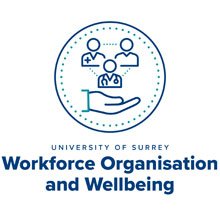

Workforce, Organisation and Wellbeing (WOW) Expert Group
Our vision is to lead high quality research and educational innovation that will inform practice and support the wellbeing of the healthcare workforce to ensure optimal staff and patient outcomes.
We do this by working with a number of professional groups – including medicine, nursing, midwifery, paramedics, psychology, and public health – alongside patients, families, carers and health services researchers with expertise in quantitative, qualitative and mixed methods methodologies.
Interested in patient safety and staff wellbeing?
Want to make evidence-based change?
Research interests
The healthcare workforce is large in number and reach and accounts for a significant percentage of healthcare expenditure. It is vital that best evidence is generated and used in the optimal organisation and delivery of healthcare which is fundamental to high quality patient care delivery in the NHS, private healthcare and third sector organisations.
We investigate policy, practice and education related to the healthcare workforce. We also develop and evaluate workforce and educational tools and interventions to improve care delivery for patients. Research and scholarship in healthcare workforce, organisation and wellbeing underpins clinician, manager and support staff’s decision making and supports students and staff to care well.
Research areas
- Workforce staffing and policy implementation
- Supporting the healthcare workforce to care well (staff wellbeing) and improve care delivery: understanding organisational determinants
- Student, employee and patient wellbeing: development and evaluation of interventions
- Systems that support staff to raise concerns and speak up
- The impact of the built environment on care delivery and patient experience
- Describing, assessing and improving teamwork in healthcare (multi/inter-disciplinary teamwork)
- Understanding the impact of colleague suicide and exploring the contributory factors to nurse distress and suicidality.
Methodological expertise
- Realist evaluation and synthesis
- Systematic and scoping reviews
- Quantitative, qualitative and mixed methods designs
- Survey design and evaluation
- Randomised controlled trials
- Ethnography; interpretative research
- User-led co-design of interventions
- Organisational case studies
- Development, implementation and evaluation of interventions
- Secondary data analysis (systematic reviews/meta-analyses)
- Feminist and decolonising methods
- Creative methods.
Schwartz Center Rounds®
Schwartz Rounds are a healthcare staff intervention developed by the Schwartz Center for Compassionate Care in Boston, USA that was introduced to the UK by the Point of Care Foundation in 2009, and now run in over 250 organisations in the UK. They are organisation-wide fora open to all staff (including non-clinical staff) and were developed to support staff to deliver compassionate care by providing a safe space where staff could share and reflect on the emotional, social and ethical challenges faced at work. They are intended to help improve staff wellbeing and ultimately patient care by supporting staff empathy and compassion. The premise is that staff are more able to make personal connections with colleagues and patients if they have insight into their own responses and feelings.
Professor Jill Maben led the NIHR-funded national evaluation of Schwartz Rounds, the largest and most robust evaluation of Rounds to-date, with findings showing the beneficial impact of attendance at Rounds on a range of outcomes, and a realist-evaluation leading to a depth understanding of how and why they work. Our outputs including films and an organisational guide for implementing and sustaining Rounds can be found on our A Longitudinal National Evaluation of Schwartz Centre Rounds® page.
Since May 2019 we have been running Rounds in the School of Health Sciences for both our healthcare students, and separately for our staff. We also have a PhD student, Duncan Hamilton, evaluating Rounds in the undergraduate setting.
Areas of interest for doctoral study
We welcome approaches from people wishing to undertake postgraduate research with us.
We particularly welcome enquiries in the following areas:
- Healthcare staff, student and patient health and wellbeing
- The impact of workforce policy changes on healthcare staffs’ ability to care effectively
- Impact of teamwork and organisational structure on staff wellbeing, clinical outcomes and care quality
- Supporting healthcare staff to deliver compassionate care
- Investigating the use of reflective practice to support staff to care well.
Please contact Freda Mold (freda.mold@surrey.ac.uk) and Jenny Harris (jen.harris@surrey.ac.uk), our postgraduate research directors, if you are considering postgraduate research.
Other outputs
University of Surrey – UoS Healthcare Workforce Resources
Research — Revisioning Nurse Distress and Suicidality
Dementia Care Coordinator, Realist Evaluation outputs
Learning disability awareness training for student midwives: Guidance for midwifery educators -download from The Together Project
Covid-19 resources. In April 2020, Professor Jill Maben and Professor Cath Taylor developed evidence informed guidance to support nurses psychological and mental health with Professor Jackie Bridges of the University of Southampton. The guidance is remains relevant to staff wellbeing post-pandemic; highlighting peer and team support and outlining what managers, organisations and leaders can do
Download our Covid-19: Guidance to support nurses’ psychological well-being (PDF)
Download our Covid-19: What can I do to support myself and others help sheet (PDF)
Watch Duncan Hamilton, a respiratory nurse, and Ann Gallagher, an ethics in care professor discuss how nurses can approach ethical dilemmas, particularly during Covid-19
Emergency medical services streaming enabled evaluation in trauma: the SEE-IT trial
NHS Postvention Study: Postvention Guidance: Supporting NHS staff after the death by suicide of a colleague (PDF)
Postvention Guidance: Supporting NHS staff after the death by suicide of a colleague: Executive Summary (PDF)
NHS Postvention study film: Three NHS staff share their experiences following a colleague death by suicide.
NHS Postvention study film: Three NHS staff share their experiences following a colleague death by suicide.
Researchers
Expert Group leads

Professor Jill Maben
Professor of Health Services Research and Nursing

Professor Cath Taylor
Professor of Healthcare Workforce Organisation and Wellbeing
Expert Group members

Dr Ruth Abrams
Lecturer

Dr Carys Banks
NIHR Research Fellow

Sarah Beck
Research Fellow

Zoe Bedford
Teaching Fellow

Chloe Burch
Lecturer in Paramedic Science

Dr Alison Callwood
Associate Professor

Dr Hilary Causer
Research Fellow

Charlotte Clee
Postgraduate researcher

Sarah Clements
Senior Lecturer - Children & Young People's Nursing

Zoe Clothier
Research Assistant

Anita Combes
Lecturer - Adult Nursing

Dr Anna Conolly
Lecturer (0.2) and research fellow (0.8)

Dr Anna Cox
Senior Lecturer in Health and Social Care

Mar Estupiñán Fdez. de Mesa
Postgraduate researcher

Andreia Fonseca De Paiva
Research Fellow

Deanna Hodge
Lecturer

Sam Laws
Lecturer in Paramedic Science

Sam Laws
Lecturer in Paramedic Science

Kimberley Lucini
Adult Nurse Lecturer Year 3 Lead

Kimberley Lucini
Adult Nurse Lecturer Year 3 Lead

Dr Carin Magnusson
Lecturer in Health Services Research

Jackie McBride
Associate Head of School – Education

Dr Scott Munro
Lecturer in Paramedic Practice

Dr Jennifer Oates
Senior Personal Tutor, Lead for Wellbeing, Senior Teaching Fellow

Neesha Oozageer Gunowa
Senior Lecturer and Pathway Lead in Community Nursing
Dr Ruth Riley
Associate Professor

Dr Karen Shaw
Project Manager

Lauren Sirey
Lecturer - Mental Health Nursing

Helen Stanley
Associate Tutor

Samantha Wakefield
Lecturer

Hayley Ward
Director of Studies for Healthcare Practice Programme and Leadership in Healthcare Programme

Dr Magdalena Zasada
Lecturer in Workforce, Organisation and Wellbeing
Our news
- Impact of Covid on Nurses (ICON) animation with recommendations and film of nurses’ experiences
- Unprofessional behaviours between healthcare staff webinar (Oct 20th 2023)- Recording of event launching guidance for unprofessional behaviours
- Unprofessional behaviours between healthcare staff: evidence-based guide explaining what drives unprofessional behaviours and what we can do about it, with some quick wins
- Launch of Unprofessional behaviours between healthcare staff guidance
- NHS Postvention study launch film: After Them: Postvention in the NHS | University of Surrey
- WOW members presented at the 6th HSR UK annual conference 4-6 July 2023. You can watch and listen to their research presentations here:
- Professor Cath Taylor: Care Under Pressure 2: A realist review examining causes and solutions to workplace psychological ill health for nurses, midwives and paramedics
- Professor Jill Maben: Time, space and place: Nurses longitudinal experience of the COVID-19 pandemic and changes suggested to improve UK healthcare workers psychological wellbeing
- Dr Anna Conolly: Co-designing interventions with nurses: The impact of COVID-19 on nurses (ICON) study
- Dr Justin Aunger: Understanding and addressing unprofessional behaviours among healthcare staff in acute settings: A realist review
- Dr Ruth Abrams: Service delivery challenges in general practice: Identifying directions for research and funding
- On 13 July 2023, performers from Surrey Choices came to the School of Health Sciences to celebrate the success of the learning disability awareness training with midwifery students. Co-trainers with learning disabilities delivered 20 learning disability awareness training sessions to 109 midwifery students over five days in June 2023
The Together Project Celebration Day - "I am beautiful": The Together Project in collaboration with Surrey Choices celebrates the successful delivery of disability awareness training to over 100 student midwives at Surrey’s School of Health Sciences.
Related sustainable development goals
We are strongly committed to creating a sustainable future, and the United Nations' Sustainable Development Goals (SDGs) are woven into our research, teaching and day-to-day life at Surrey.






Stay connected
Latest tweets
@WOW_Surrey







